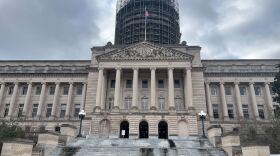The annual Festival of Faiths returns to Louisville this week.
This year’s theme is “Sacred Belonging” and one of the sessions exploring that is “The Beauty of Radical Inclusion.”
Presenter M. Shadee Malaklou is the founder of the bell hooks center at Berea College, where she also chairs the Department of Women’s, Gender and Sexuality Studies.
I spoke with Malaklou about what radical inclusion looks like in practice, and how it might help us bridge divides in our communities and beyond.
This conversation has been edited for length and clarity.
Ayisha Jaffer: What does radical inclusion mean, and how does it connect to this year's festival theme of sacred belonging?
M. Shadee Malaklou: For me, I take the meaning from bell hooks and the ways in which she found radical belonging in Appalachia — not in the liberal halls of academia. She intentionally came back to Appalachia in 2004 when she joined Berea's faculty, she said: All of who I am, spiritual seeker, writer, critic, etc. was a seed planted in the soil of Kentucky.
In her book “Belonging,” she really outlines the ways in which Kentucky is her fate. That she learned her waywardness from, quote, “the hillbilly country folk,” who were her ancestors and kin, not from progress-obsessed narratives whereby who you are, rather than what you stand for, is definitive of how you belong.
AJ: For those who don't know bell hooks, can you talk a bit about who bell hooks was and what inspired you to create the bell hooks center at Berea College?
MSM: I think bell hooks was a great many things, but the ways in which many remember her is as someone who could translate the feminist theory of the academy into the public interventions we needed in the moment.
I was always a lifelong student of hers, and just so honored to be in conversation with her once I got here. And I never expected to get her blessing to name the center that we were creating to support women and gender-nonconforming students after her as we were redesigning it to be gender-inclusive, to be size-inclusive and to be disability-friendly. She was so taken with it that she said, “Why don't you name it the bell hooks center?” And I said, “What do you want it to stand for?” And she said, “Feminism is for everybody, and patriarchy has no gender.”
AJ: We're living in a moment of deep polarization, politically, culturally, even spiritually. How can the idea of radical inclusion help find us some common ground or build community across those divides?
MSM: Interestingly, bell found community here in eastern Kentucky. People in Appalachia understand the lie of a progress narrative that has only ever served to divide us. And what has been so amazing here is that I can walk into the bagel shop just like I'm being interviewed for CNN, or in my muumuu or in my pajamas or in my hospital gown, and I am treated with the same dignity and respect.
There's a kind of stillness here that I think has the potential for radical, radical inclusion. But bell, she called her feminism, a quote, “talking back,” and quote, “gesture of defiance,” and yet she led with love.
“All About Love” is not a break from her radical feminist writings. It is an argument that love is the way, and justice is the destination. Love can be ammunition. It really can.
AJ: What are ways that each of us can practice or move towards radical inclusion in our daily lives?
MSM: I think that we need to remember that identity politics is something we moved away from for a reason, that just because someone is of a certain racial makeup or gender or gender-ambiguous makeup or lack of a makeup, that somehow there's an authority there.
And there are little things one can do to recognize, for example, how much space you take up in meetings, in rooms, in classrooms. To recognize the privilege with which you operate, to recognize that you can say things others can't and to speak up, because you can say that thing, check yourself at every move.
I think those are the kinds of examples that subconsciously I'm thinking of as we're having this conversation.
Editor’s note: The Festival of Faiths provides support to Louisville Public Media.






